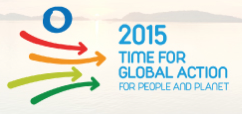 July 2015: Civil society organizations have responded to the Addis Ababa Action Agenda (AAAA) of the Third International Conference on Financing for Development (FfD3), and have released responses and summaries to the draft outcome document for the UN summit for the adoption of the post-2015 development agenda. Responses address, inter alia: areas of consensus and disagreement on the post-2015 draft; recommendations on improving text related to inequality, climate change, energy, land and other topics; data challenges; the translation of discourse into policy; education; and the role of business.
July 2015: Civil society organizations have responded to the Addis Ababa Action Agenda (AAAA) of the Third International Conference on Financing for Development (FfD3), and have released responses and summaries to the draft outcome document for the UN summit for the adoption of the post-2015 development agenda. Responses address, inter alia: areas of consensus and disagreement on the post-2015 draft; recommendations on improving text related to inequality, climate change, energy, land and other topics; data challenges; the translation of discourse into policy; education; and the role of business.
Romilly Greenhill, Overseas Development Institute (ODI), reflects on the implications of the FfD3 for the proposed Sustainable Development Goals (SDGs) in a Devex blog. She highlights three shifts in emphasis: the new social compact on the provision of social protection systems and measures for all, particularly the poorest and most marginalized; action on data; and the Addis Tax Initiative, which will support countries to improve tax revenues. Greenhill concludes that the AAA is a “helpful framework for action” but will require more concrete commitments by donors.
Global Policy Watch (GPW) released a summary that shows where consensus does and does not exist on the post-2015 development agenda’s preamble and declaration; goals and targets; means of implementation (MOI); and follow-up and review. ‘Green, yellow, red: The state of the debate around the post-2015 development agenda’ highlights a lack of consensus, or red areas, related to: the preamble and the Chapeau; reference to the principle of common but differentiated responsibilities (CBDR), in particular for climate change; the 5 P’s (people, planet, prosperity, peace and partnership); Heads of State engaging on a text with reservations; revision of indicators and targets; the role of FfD3 as a MOI for the post-2015 development agenda; national ownership, standards and reports; and regional peer review.
Oxfam released a response to the final draft of the outcome document, which addresses recommendations related to inequality, climate and energy, gender equality, health, land international financial institutions (IFIs), MOI, implementation, and follow up and review. Oxfam expresses concern that text on climate change remains weak and defers climate action to the UN Framework Convention on Climate Change (UNFCCC). It recommends stronger reference to adaptation, as well as strong, consistent messages on sustainable energy access. On land, Oxfam recommends recognizing the necessity of land rights in building inclusive, sustainable economies, and of customary land rights in ending poverty and hunger among the most vulnerable, particularly indigenous peoples. Oxfam further recommends, inter alia, welcoming but not endorsing the AAAA, noting “its outcome does not amount to adequate or appropriate MOI.”
Also on accountability mechanisms, the Institute for Advanced Sustainability Studies (IASS) released a report on its multistakeholder dialogue, ‘Europe and the Post 2015 Development Agenda: shaping effective follow up, review and accountability mechanisms.’ The event discussed Europe’s role in shaping effective follow up, review and accountability mechanisms for implementing the SDGs, with a focus on the sustainable production and consumption of biomass in and by Europe. The Sustainable Development Solutions Network (SDSN) Germany and Spain co-hosted the dialogue, which took place from 29-30 June in Brussels, Belgium.
Kevin Watkins, ODI’s Executive Director, discusses how to convert the “leaving no one behind” discourse into implementable policies in a blog post on post2015.org. Observing that the world is currently “way off-track for delivery,” Watkins proposes building the agenda on five pillars: a data revolution for the poor, including real-time data; stepping-stone equity targets; progressive universalism; universal commitments; and a global compact that includes a social floor of cash transfers and universal health and education.
In another post2015.org blog post, Harpinder Collacott, Executive Director Designate, Development Initiatives, uses an example from Uganda to illustrate that necessary data is not yet available or accessible to lift every person out of poverty and leave no one behind. He stresses that data should: put people at the center; describe problems; quantify available resources; monitor performance of services; be disaggregated at sub-national and local levels and available for use by district officials and community-based organizations. Collacott recommends, inter alia, starting to generate needed data and counting and recording people across all sectors and districts using common standards that can break down silos.
On education, ChildRightNow calls for achieving universal primary and secondary education targets in advance of other dependent targets to ensure that the expansion of quality education contributes to achieving other targets. The group proposes revising the target deadline to “as soon as possible, and by no later than 2030.” It also suggests focusing on ensuring consistency with other SDG targets and with international agreements, such as the UN Convention on the Rights of the Child and the International Labour Organization (ILO) Convention on the Worst Forms of Child Labour.
The World Business Council for Sustainable Development (WBCSD), the UN Global Compact and the Global Reporting Initiative are developing a business monitoring framework for the SDGs. The SDG Compass aims to guide companies on how they can contribute to achieving the SDGs using a five-part framework. The draft SDG Compass is available for public consultation until July 31.
In response to the revised draft of the outcome document for the UN summit for the adoption of the post-2015 development agenda, which was released on 26 July, several more groups have stated their intention to release responses, which will be available in the coming weeks. [Greenhill Blog] [GPW Blog] [ODI Executive Director Blog] [Development Initiatives Blog] [Oxfam Recommendations] [SDG Compass] [IASS Event Website] [IASS Website] [ChildRightNow Website] [IISD RS Sources]